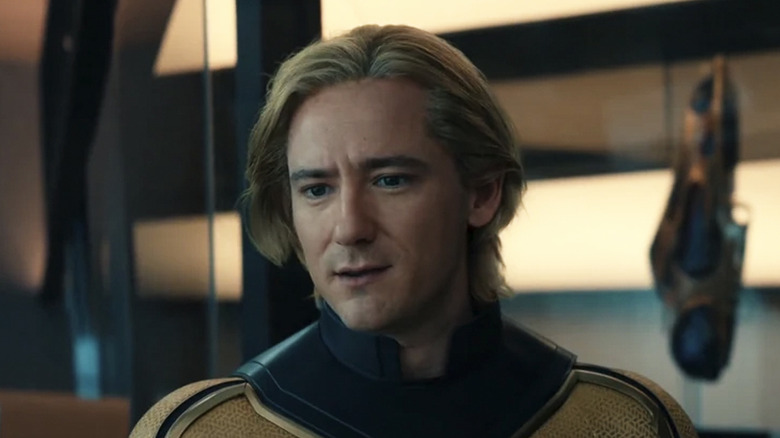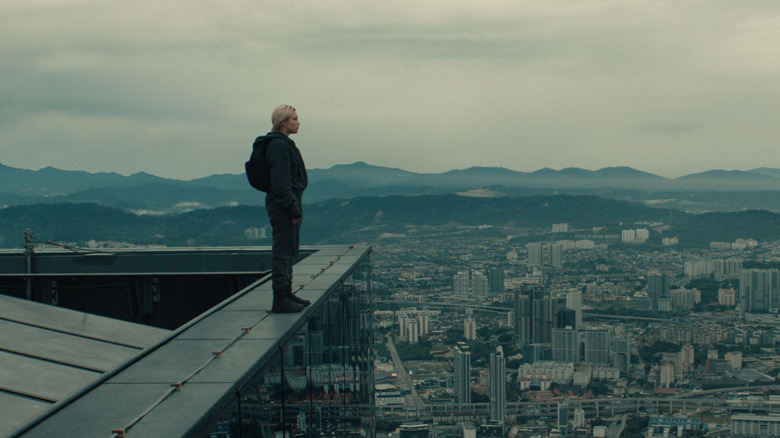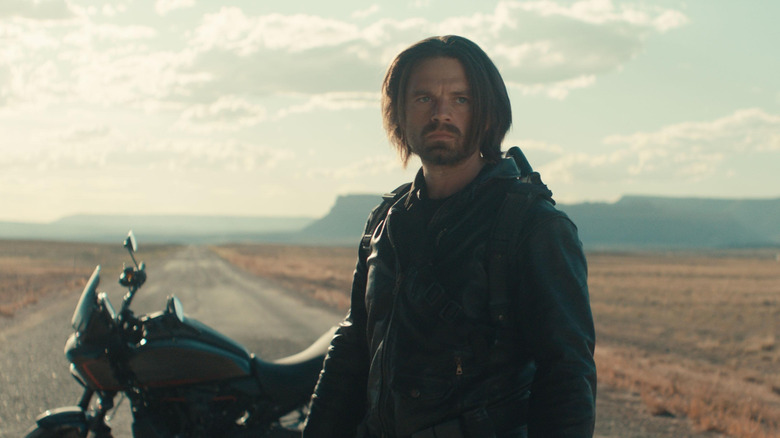Why Marvel's Thunderbolts* Is A Better Story About Hope Than Superman
The fans of James Gunn's new film "Superman" seem fond of the movie because of its themes of hope. This Superman, as played by David Corenswet, is guileless, unsophisticated, maybe even a little dumb. He's aggressively uncool, and that's kind of the point. He declares that kindness is the new punk rock. He's the type of Superman who, in the middle of fighting a fire-breathing kaiju, stops to rescue a squirrel. Gunn wrote and shot "Superman" with a Saturday morning cartoon vibe, and many audiences are jibing with its innocent childishness (despite the PG-13 rating). Unlike the past 15-odd years of superhero cinema, "Superman" doesn't behave like a cooler-than-thou rock star. Most of the Marvel Cinematic Universe heroes were flippant and witty and kept their cool in extreme situations. Superman is more concerned with helping people than with appearing "awesome." Some find that to be a refreshing change of pace.
I find the themes of hope in "Superman" to be a little shapeless. Yes, Superman is devoted to helping people, and he is devoted to ending wars, but he is, in that capacity, no different from any of the other vigilantes we've seen on movies screens in the last decade-and-a-half. Tony Stark, a.k.a. Iron Man, was once a selfish billionaire who made his money selling weapons. After a traumatic experience, he devoted his intellect and fortune to disarming the world, destroying his company's weapons, and aiding in construction. All superhero movies, in some capacity, are about hope. The world of heroes is predicated on the notion that justice can be meted out in an unjust world, provided heroic, capable people step forth. No matter how "dark," most superhero movies are about how tenacity, strength, bravery, and friendship will win out in the end.
"Superman" may be more vocal about its themes of hope, but, in practice, its hopefulness is de rigueur.
But you know which film actually had to fight for its hope? A film that had to swim out of a sea of despair to find glimmers of life again? Jake Schreier's "Thunderbolts*."
Superheroes are violence-makers
I'll get to "Thunderbolts*" in just a moment.
The central irony with Superman is that, in addition to saving cats from trees, catching falling planes, and blocking bullets with his body, is also a skilled fighter. There are some scenarios wherein Superman still has to ball up his fists and fight. He is ready to do violence, should the situation call for it. In extreme cases (depending on the version of Superman you're used to), he might even murder a villain to cease their villainy. Superman is a symbol of hope, but he also hurts people. One of his powers is a destructive eye laser. He doesn't use his powers to kill ... except when he does.
Indeed, superheroism is, in practice, a lifestyle of violence. Heroes fight. They punch. They shoot guns. They fire eye beams. A superhero is a freelance soldier, often with self-endowed free rein to hurt criminals and murder bad guys.
Imagine yourself the hero. What happens when all that fighting, all that violence, all that mayhem that you're constantly exposing yourself to finally gets to be too much? Heroes live next to villainy and darkness every day, using their own murder skills to take care of it. From their eyes, the world is constant chaos and despair. Fight. Fight. Fight. Kick. Punch. Bleed. Die. Repeat.
This is where the Thunderbolts come in. The characters in Schreier's "Thunderbolts*" are damaged. They are depressed. They have been vigilantes, assassins, and badass fighters for so long, their souls have begun to erode. Most of them were once villains, and their turn to heroism doesn't seem to entail any less fighting. Also, their life of heroism hasn't gotten them anything. The world is just as chaotic as it has always been, and they aren't living comfortably. The Thunderbolts are, at the start of their film, swimming in a sea of despair.
These characters, who aren't godlike aliens, don't have the luxury of hope. They have to look at violence from a street-level perspective. They've had blood on their hands, often literally.
Thunderbolts* isn't just about hope, it's about escaping despair
Being a capable, violent superbeing is, to the Thunderbolts, only proof that the violence will never stop. This has always been the selling point of Marvel over DC, incidentally. The DC heroes are unflappable gods we are meant to aspire to. Marvel heroes are everyday people with powers, living on with their neuroses intact.
The villain in "Thunderbolts*," Valentina Allegra de Fontaine (Julia Louis-Dreyfus), aims to turn Bob (Lewis Pullman) into a Superman-like being called the Sentry. Bob, like all the other Thunderbolts, is still running from trauma, addiction, and a life of abuse. Unlocking his powers turns him into a sociopath. If he is all-powerful, like Superman, why bother holding back his dark impulses? He frees himself from morality, turns inward, sees blackness, and becomes a villain called the Void. He proceeds to drop a shadow on New York City, sucking humans into individualized hell-like pocket dimensions where they constantly relive their unhappiest memories. Bleak stuff.
The Thunderbolts cannot fight him. The only way to defeat the Void is to cure him of his despair. Explain to him that life is worth living. The Thunderbolts are miserable, they are full of hopelessness, and they want to lay down and give up.
But they don't.
They have found that helping others, that being friends, that expressing love, can keep one going. The Thunderbolts enter Bob's brain, not to hurt him, but to understand him. The climax of "Thunderbolts*" isn't about the heroes overwhelming the villain with violence, but giving him a hug, knowing that earnest, deeply-felt scraps of hope can pull him away from the edge. There is no despair so great that it can't be defeated by a tiny glimmer of mutual human understanding. At the end, hope wins in a sea of despair, and that's more inspiring than anything.
"Superman" pays lip service to hope, but the Thunderbolts needed it to survive. Hope didn't just live on. Despair was defeated.


